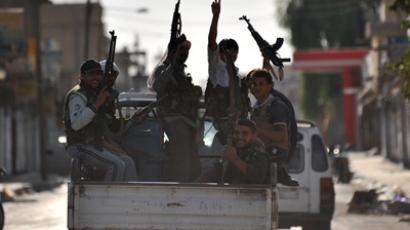‘The only US policy towards Syria is to blame Russia’- Russian MP
‘Weak, contradictory’ American policy concerning the Syrian conflict may result in disaster for Syria and Turkey, the head of the Duma International Affairs Committee, Aleksey Pushkov told RT.
Pushkov warned that Islamic radicals may come to power in Syria and said that Turkey could drag itself into ethnic war. In the interview with RT’S Anissa Naouai, he explained that only open negotiations, rather than backing a side, will solve the Syrian crisis.RT:I’d like to begin with diplomacy. In the world today it seems even more powerless than ever with situations like conflict in Syria. Do you think that there is a political solution, that through words we can have peace there?AP: I think the situation has extremely deteriorated since last spring and it looks more like a bloody deadlock that doesn't offer hope for peaceful solution. Yet I think that international community can generate nothing better than Geneva communiqué adopted last June, which says that international community has to bring those sides to the negotiation table. There is no secret here, there are no magical answers. The answer is for both sides, Russia / China on one hand and so-called ‘friends of Syria’, it is not through backing one of the sides in the conflict that it can be solved. I think Russia and China are closer to this understanding than the United States or their European alliance or Saudi Arabia. Unfortunately, their stance until now has been, ‘Assad days are numbered, he has to go’, it is not a policy. We should try to understand that it is not by arming and financing Syria's armed opposition that a solution can be found. The armed opposition has no strength to dislodge President Assad. President Assad seems not to have enough strength to crush the military opposition, so here we are really in deadlock. So, on both sides we should find people who could start to negotiate.RT:What about Turkey? Do you think we’ll see any conflict between Syria and Turkey or anywhere else in the region?AP: Turkey can be dragged or drag itself into this conflict. But I have a feeling that the leadership of Turkey understands very well that if they go too far in Syria it may become dangerous for Turkey itself. You know that an important Kurdish man is living in Syria and in Turkey the Kurds are fighting for a free Kurdistan. So Turkish involvement in the war in Syria may have a lot of traps for Turkey, it’s not by chance that Turkey has refrained from crossing the border and sending its ground troops to Syria. It is easy to go in, it’s difficult to get out. The story of all the conflicts in that region, Afghanistan, Iraq etc., shows that the decision to go in is taken in two days and it takes years and years to get out. So I don’t think that the Turkish government is really willing to have an open war with the Syrian government. Those two states are basically on the brink of war and this is very dangerous because on the other side of the local map we have Iran and we have all this talk about possible military strike against Iran’s nuclear capabilities. It is kind of a knot that should be untied bit by bit, now I think it’s high time to start to untie the Syrian knot.RT: There’s a deadlock, a lot of blood, thousands of people have been killed, infrastructure destroyed. But [Syria] is not a country like Iraq or Libya that have oil to rebuild itself if we ever see an end to this conflict. Who can possibly benefit from this fighting in what obviously seems to be a losing situation for both sides?AP: Syria has some oil but you’re quite right it’s not the amount which will be sufficient to rebuild the whole country. Syria, by the way, whatever can be said about the rule of Assad family was a pretty decent, economically and socially, country in the Arab world. I visited Damascus last February and the city produced a very good impression on me. It was kind of a European city, it was very open city, open-air city, very secular in style. It is an Islamic country but somehow the style of living was very modern. And you could see women sitting with their husbands in café, nice restaurants. Economically it was quite clear that Damascus was one of the points of attraction in this region. So it’s really a pity that the country that has been enjoying quite an important economic growth, which has now descended into shambles. And who will profit from the destruction of Syria? I think only those who’re after establishing a radical Islamist regime in Syria. There are some countries in the Arab world and the Muslim world that are financing radical Islamist forces and are quite willing in the case of Syria to support the Sunni radicals against the Shia who are now in power at the expense of the Christians, of the Kurds, of the Druze and other minorities that are living in Syria. So in some capitals of this area this conflict is considered through completely different eyes, it’s about installation of the Sunni rule in the country which had been ruled by Shia minority for 40 years. But it was exactly the fact that this country was ruled by Shia minority that allowed to have that multi-ethnic and multi-confessional combination in Syria which worked. I mean, for 40 years there have been no ethnic conflicts in Syria, there was no ethnic cleansing. So my feeling is that what is being done today in Syria is an attempt to crush this multi-ethnical and multi-confessional peace and to establish one group of people and one religion who would be much higher above the others or even one brand of a religion that would be radical Islam and Sunni radical majority that would lead the country. But I think we should see where it leads, look at Saudi Arabia where we have quite an Islamic-minded government, let’s put it this way, we don’t have democracy there.RT: And they get along great with the United States. Where’s the US stand in terms of regime change? They’re very open, it’s no secret that they want Assad to go. And then, they’re pushing on Russia and criticizing Russia that it’s them and China who are blocking any kind of progress on a solution.AP: The United States to my mind are completely mixed up here. Actually they are the reason of the large part of all this mess has triumphed so to say in Syria. The United States try to prove us that with the help of Qatar, where there’s no constitution and the opposition is being crushed, or of Saudi Arabia, where there’s no constitution and even the remote notion of what democracy is, they will establish freedom and democracy in Syria. And I wonder who can believe this, I wonder whether the American diplomats, do they put two and two together. The US position is completely flawed. I think basically that the US themselves are at a loss in this situation, they don’t know what will happen, they don’t know who are the forces that will come to power. When Hillary Clinton was asked on the Congress hearings, who are the people the United States support politically in Syria, she said ‘I don’t know’. And also she was asked why actually Mr. El-Zawahiri, one of the leaders of al-Qaeda, says that Assad is their main enemy. In a paradoxical twist of history, Hillary Clinton and El-Zawahiri find themselves on one side of the fence against President Assad. How America reached this unbelievable position, I do not know. I think it is very contradictory, very weak, I think the US had no policy towards Syria and the only policy they have is to blame Russia. They are very lucky to have Russia because at least they have somebody to blame. If Russia was not around the void of American foreign policy on Syria would have completely been clear to everybody.RT: Right, let’s talk for a moment about the forces that will come to power in the US. They are having elections very shortly. What does that mean for Russia, does it matter who is going to be in office for the next four years in terms of foreign policy, to expect any changes either way?AP: Well, the Russian President said already a couple of times that we will work with the President who’s chosen by the American people. So I don’t think that Moscow would like to take sides. Unlike, by the way, our American friends who always like to take sides and who show that they would like to have this person as a President or that person as President, and the one who is popular in the country, they would not like him to become the President of Russia. We have a different approach, but Mr. Romney complicated everything. Basically, he set the tone of this election to the extent as Russia is concerned and he made us choose almost immediately when he said that he considers Russia to be America's number one geopolitical foe. After this the answer from Moscow is evident, who is the President we would like to win. As I say, Mr. Romney said it all. So we definitely would not like to have a President who has some kind of negative attitude about Russia. For half a year, or a year, if Mr. Romney is elected, it would be a year of farcical, theatrical Cold War, mostly rhetoric, but still it will poison the relationship to a large extent. I think the reset declared by Mr. Obama, although it was very much criticized on both sides in the United States and in Russia, I think it has produced something. And the most important result of that reset is that the tonality has changed because basically the relationship between Moscow and Washington, between the Kremlin and the White House, turned to ashes in the last months of George Bush's second presidency. The reset brought a new tone and atmosphere in the Russian-American dialogue. The relationships between Mr. Obama and Mr. Medvedev and even between Mr. Obama and Mr. Putin are decent relationships. They have of course their complications and the differences have not gone away on a number of issues. But still it’s an atmosphere at which we can consider ourselves as partners. Partners with disagreement but still partners. With Mr. Romney we will be forced to consider ourselves as enemies, so it’s definitely preferable to have partner you heavily disagree with, than an enemy which would kind of be a clear cut enemy. So I think that Russian choice in those American relations is absolutely clear.














